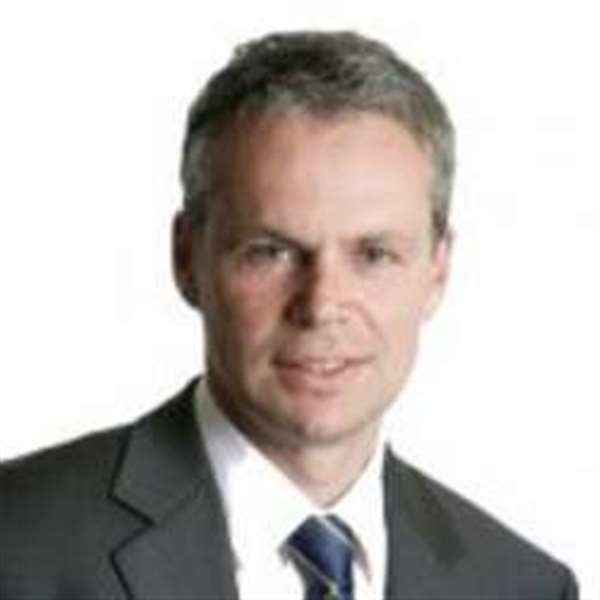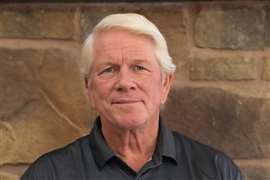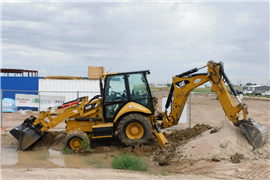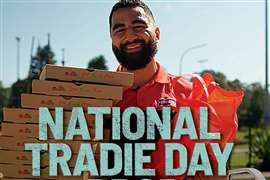Loxam on access
03 July 2018

When Loxam bought Lavendon last year it propelled its access fleet into the world’s top three. Just over a year later, Don Kenny, the CEO of Loxam’s access division, shares his views with Euan Youdale on the group’s acquisitions and the state of the industry.
Don Kenny joined the publicly-listed Lavendon Group in 2011 as its CEO, until the group was acquired by privately-owned Loxam at the end of the first quarter of 2017, at which point he took on the same title, this time as head of the newly-formed Powered Access Division (PAD) of Loxam Group.
Most of us will remember the tussle between Loxam and TVH Group in the final weeks of 2016 as both companies sought to buy Lavendon. In the end Loxam was the well-documented victor.

The pairing of the two companies, along with Loxam’s other major acquisitions last year, including Hune, in Spain, Nacanco in Italy, Cramo’s Danish business and Swan Hire in Ireland, means it now has the world’s third largest powered access fleet, along with its vast general rental offering.
This flurry of acquisitions helped Loxam to a 48% increase in revenues to €1368 million in 2017 - the company’s 50th anniversary year, with EBITDA profits rising by 52.2% to €464.0 million.
“We are really a self-contained division within the Loxam group,” explains Kenny. “Day-to-day, I’m still doing the same job, in terms of the business and customers, systems and processes, budgets, etcetera. The difference now is that we do not report to the city, so I don’t have a share price to worry about. I used to have lots of shareholders, I now have one shareholder, [Loxam president and owner Gérard Déprez].
Kenny adds, “Gérard had a vison to create a division of Loxam that is a centre of excellence for powered access; to retain the knowhow and expertise in Lavendon. So, all the systems and processes and expertise of Lavendon is still here, ringfenced in the powered access division.”
New structure
Over the next few weeks and months, the structure of the Loxam access division will be rolled out and its branding introduced.
Essentially, it means the Lavendon name is no longer in use and has been replaced by the new Powered Access Division (PAD) of Loxam Group, with a number of the previous Loxam Access business units now a part of that segment too.
“The Lavendon name doesn’t really feature in the marketplace anymore. It was only ever really used at a group level. France was ironically the only location that we used Lavendon [as a brand name],” says Kenny.
Indeed, local knowledge is paramount in the rental sector. As such, well-known and respected company names will remain a strong part of PAD. For example, in the UK, Loxam will continue to trade as Nationwide Platforms, a globally recognised leader in work at height safety initiatives and products through its BlueSky Solutions arm, which, for example, pioneered secondary guarding. In addition, it is the world’s largest IPAF operator trainer. For this reason, the former Loxam Access UK business has been integrated into Nationwide and no longer exists as a separate entity.
In addition, PAD will continue to trade as Rapid Access in the Middle East and dk Rental in Belgium - both former Lavendon businesses. In Italy, the Nacanco branding will also be retained, following the acquisition of the business in November 2017. In each case the local branding will clearly state that they are a Loxam Company.
Brand loyalty
Variations to that rule can be seen in France, for example, where Lavendon France has been integrated into the pre-existing and much larger Loxam Access business. And in Ireland, the company will continue to trade as Loxam Access.
“The ownership of the company is really not a consideration we find,” says Kenny, “Where we have a market leading brand it would make no sense whatsoever to take that brand away.
“Even PAD is an internal term. Not many customers are concerned whether its PAD, or Lavendon Group or Loxam Group; they just want to know who they interface with. Having spent so much capital in developing those brands it would make no sense to change them all.”
Kenny adds, “But we are not shy about the Loxam heritage. We are very pleased to be part of the biggest rental company in Europe and there are lots of advantages to it.”

Bearing all this in mind, one might not be surprised to learn that just over a year on from the bidding war between TVH and Loxam to buy Lavendon, Kenny and his colleagues at Loxam believe it was a sound deal.
“Looking at it from the Lavendon shareholders point of view, I didn’t hear many people complaining. I think they see it as a fair transaction and they got a fair value for the business. And looking at it from the Loxam perspective I don’t hear anyone complaining that they overpaid.
“I think we demonstrated in our performance since they acquired us that it’s a good business; we have delivered on our expectations. Loxam has turned out to be a good home for the ex-Lavendon people.”
While Loxam’s acquisitions last year saw it record a revenue growth of nearly 50%, the company also increased its business outside of France, which now represents 39% of the total, up from 14.4% in 2016.
With international expansion very much part of the plan, Loxam’s decision to sell Gardemann - the former Lavendon business operating in Germany - to TVH, just weeks after completing its acquisition, could be seen as a departure from this ambition.
TVH is now the dominant player in Germany by some way, with its pre-existing Mateco business and Gardemann’s 3500 MEWPs combined, offering a fleet approaching 10000 units.
Kenny, however, views the situation differently. “Rather than have a hand-to-hand fight with TVH in Germany, and because we like to be the market leader, we saw an opportunity elsewhere, which was Italy. So, we came out of Germany, but we have moved into Italy.
“The lesson to be learned in all this is there is no hard and fast rule – we don’t have to do this or do that in any market; opportunities present themselves and you go with the flow.”
Nevertheless, Kenny believes the acquisition trend is set to continue at Loxam. “I can only look at the track record of Loxam; they have always been involved in acquisitions.
“I think last year was a particularly active year and they have transformed the outward facing shape of their business where they were very dominantly a French business. France is still very important to them and they are very dominant in France but they operate in 24 different countries now, so I think the future is bright and exciting.”
Last week, just after this interview went to press, it was announced that Loxam had acquired Haulotte’s Italian rental subsidiary No.Ve. srl (Nove), for an undisclosed sum. See the online story.
The group’s powered access fleet now represents around 50% of the overall businesses. “Acquiring the 22000 machines from Lavendon gave Loxam a boost but they were already very familiar with powered access - they doubled up what they already knew and have given it more emphasis.”
Asked if the 50% powered access fleet ratio will increase, Kenny answers, “I think there will be growth generally. Loxam wants to grow their business organically and through acquisition where opportunities present themselves. I’m not aware that Gérard wants to focus in one particular segment.
“I do believe there is a move to consolidation in all of the markets in Europe. If there are interesting opportunities, we will have a look at them. Nacanco proves the case, it’s a market we were not in, so we came aware of an opportunity and actioned it.”
It’s not all about buying opportunities, however. “I don’t want to give anyone the impression all we are doing is looking for acquisitions.
“We need to get on and run the business. That’s how we grew the Lavendon business, it wasn’t through acquisition, it was through organic growth. Getting better use of our fleet and having better processes in our business; that is the main thrust.”
Clear ambitions
It would seem then organic and acquisition growth combined, PAD is set for significant expansion over the next five years. “I am not one of these people who is constrained by GDP growth, in that you can only grow your business by XX% because the overall market has grown by that.”
Kenny continues, “In the UK where there are 56-57000 machines, we have 12000 units. So, I keep saying to my guys, ‘don’t tell me the market has only moved by XX because of GDP, there are 40000 machines that we are not renting’. There is loads of opportunity and the limit to our growth is our ambition and our ability to convince customers we can offer a great service.”
A key factor in all of this is penetration, says Kenny. “We are not in the powered access market, we are in the access market, which includes all the traditional forms, like ladders, mobile towers and scaffolding.
“In the UK the powered slice of the access cake is very big, there is a very high level of penetration, maybe 70%-80%. In the Middle East it is the opposite, some people would say it is only about 10% and in the entire Middle East market there are 12000 machines; the same number as London. If you look at the forest of skyscrapers and the abundance of construction sites, you wonder, “how can there be just 12,000 machines?
“There is a big education and training process to convince people in the Middle East this is a better way of building than the conventional methodologies. We are on that journey.”
Thankfully, the path in many emerging nations is becoming smoother and wider. “There are always seminal events by which you can say a market really starts moving,” says Kenny, “I think the 2022 World Cup in Qatar has been a real catalyst for a step up in awareness of health and safety in the Middle East. And there are many international companies in the Middle East that take health and safety extremely seriously. The oil & gas industry has been one of the leading lights in terms of health and safety.”
Options open
Heading further east, Asia is beckoning as a major access market, with some parts of it already proving very fruitful for those involved. Apart from well-established China, there are the likes of Southeast Asia and India promising to offer some of the next big markets. Would Loxam consider expanding in these areas? “I can see that happening in time,” says Kenny, “Although I don’t want to give the impression we are running around the area with a cheque book. We keep our options open.
“For example, Loxam are in Brazil and Colombia and in Morocco and North Africa. I am not aware there are any limitations - it’s an opportunity-rich environment.”
A continent yet to be mentioned is North America; representing the biggest access market in the world and arguably offering perhaps the greatest challenge when it comes to taking market share. Would Loxam and PAD specifically be interested in such a challenge?
“I can’t really comment on that,” explains Kenny, “If you were talking to me with my previous hat on at Lavendon, I would say I am very happy to go and open up in America, I just need an investor to give me £1 billion to do it.
“The one company in the US that was comparable in size to Lavendon was NES Rentals, which was bought by United Rentals last year for $1 billion. That’s the entry ticket.
“I can’t comment on what Gérard’s thoughts about it are. When I was at Lavendon, I did have shareholders ask me about it and that was my response.”

On the subject of capital expenditure, Kenny is convinced that as the business continues to be profitable and to grow, then capex will grow in accordance with that. To provide an indication, in 2017 equipment capex stood at €400 million.
“The lesson we have learned is that the solution is not just adding more kit but its making the kit you have be more effective and efficient. When we talk about the fleet at a high level I think of it in terms of a number of key metrics: the size of the fleet, the percentage on hire, the percentage in transport, the percentage under repair and the percentage not available. For anyone who runs a rental business these are the main levers.”
Is there an estimate for PAD’s capex next year? “It’s early days at the moment. One of the things about the rental industry is that it’s fast moving - its closer to retail than general service delivery.”
Kenny adds, “We are bit more worried about the 2018 performance. The underlying business is good but it’s fair to say the bad weather we had in Europe has not been a tailwind. The problem with bad weather, particularly snow, the construction site shuts down and you cannot move any kit. We have had bad weather before, but we have not had it spread out over so many months. It’s not a problem you have in the Middle East, which has made a very good start to the year.”
Weather aside, the strength of the European market is good, Kenny insists. “All the markets are in decent shape.” For example, “I have never seen a French market like it in my time in business. France is going from strength-to-strength. They have won the 2024 Olympics and have the Grand Paris project.”
Spain is starting to show good signs of recovery too. “It’s a well-known fact Lavendon had a business in Spain but we pulled out in 2010/11 because it was such a crash. Loxam timed the acquisition of Hune very well and are now benefiting from the growth rates in Spain and Portugal.”
Considered expenditure
On the subject of buying machines, Loxam is such a big company, it’s buying choices could have a major impact on manufacturers. As Kenny explains, the company is focused on being a responsible customer and it talks to all the OEMs.
“Lavendon was very much a Genie house but we have used other equipment. Loxam have got other equipment and I see us continuing to talk to all the manufacturers going forward.”
One of the Lavendon systems brought over to PAD, along with the L-Vis IT system, is its central pricing policy, under which prices per unit for MEWPs are negotiated at PAD head office and any orders from branches across the division adhere to that arrangement.
“We make sure everyone gets a slice of the cake,” says Kenny, “We are driven not by brand loyalty but loyalty to the machines – our first priority is the best machines. If everyone was equal, then we would make sure that everyone is getting something.”
An area of huge interest is hybrid and electric-powered equipment. “Increasingly, we are having to look ahead to where we think the market is going. Seeing cities now introducing emission zones, it means you have to be cognisant of the fleet you have today and the fleet you will need in four or five, or even 10 years’ time. It’s now becoming a three-dimensional planning exercise as to where to go with fleet.”
One thing is certain, the company will have fewer diesel machines in the future. “It’s where the industry is going, and we see ourselves as having an important role to play in that and an impact on how we spend our capex.”
The increasing competition in the market, with new OEMs appearing in Asia and the mature markets, is proving to an interesting development for major rental companies. “The more competition between the OEMs the better,” says Kenny. “We see the functionality and the effectiveness of the machines improve. I’m always being told that competition is good for rental companies because it keeps us lean and mean and the customer happy, so the same philosophy applies to the OEMs.”AI
STAY CONNECTED



Receive the information you need when you need it through our world-leading magazines, newsletters and daily briefings.
CONNECT WITH THE TEAM











